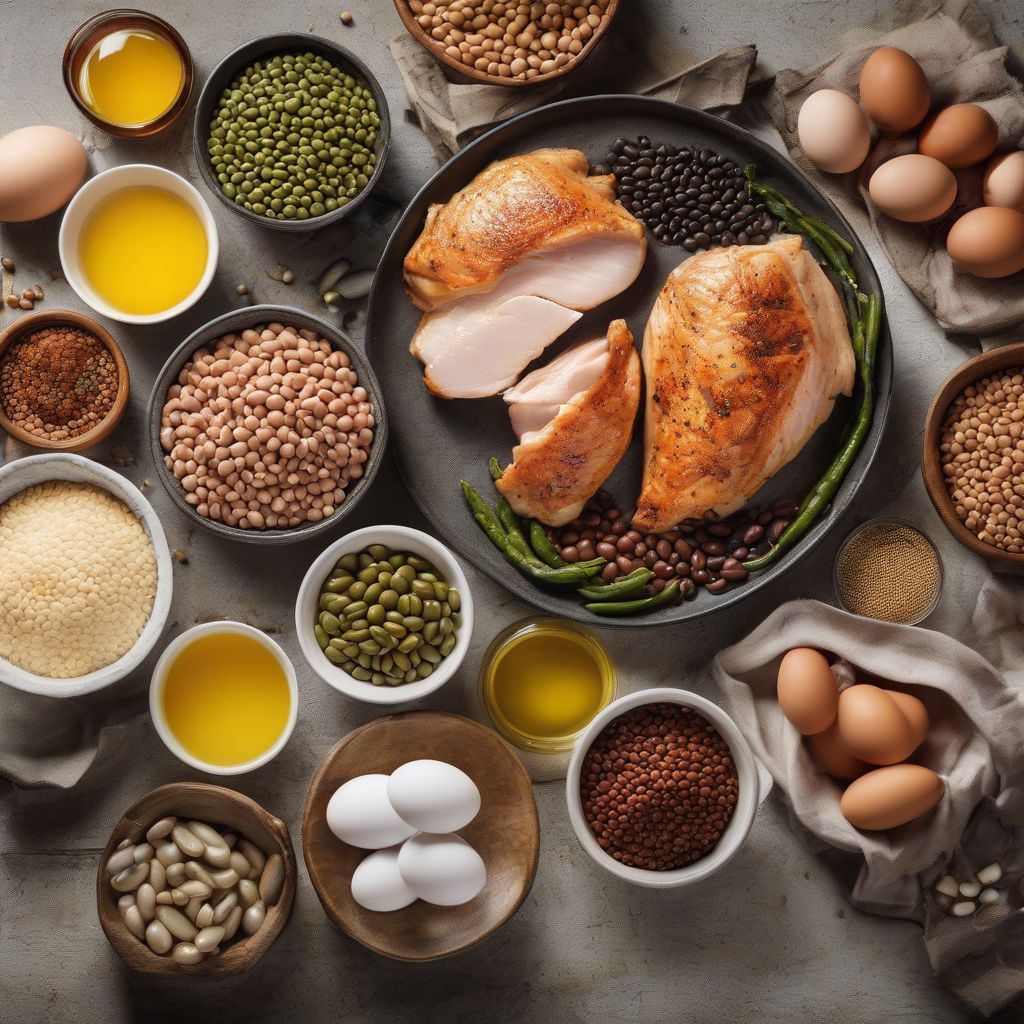Imagine this: you’re hitting the gym consistently, putting in the work, but your muscle gains seem to be stuck in slow motion. You’re left wondering, “What am I missing?” The answer might be simpler than you think: protein.
As a certified nutritionist and meal prep coach, I’ve seen firsthand how the right nutrition, particularly adequate protein intake, can be a game-changer for muscle building. It’s like providing the building blocks your body needs to repair and construct those hard-earned muscles.
This guide delves into the world of high-protein foods, equipping you with the knowledge to optimize your diet and fuel your fitness journey. Get ready to power up your meals and unlock your muscle-building potential!
Why Protein Matters for Muscle Growth
Let’s break down the science behind why protein is non-negotiable for those sculpted muscles you’re after.
1. The Building Block of Muscle Tissue
Protein is made up of amino acids, the fundamental building blocks of muscle tissue. When you engage in strength training, you create tiny tears in your muscle fibers. Protein provides the necessary amino acids to repair these micro-tears and build them back stronger, leading to muscle growth (also known as hypertrophy).
2. Enhanced Muscle Protein Synthesis
Consuming protein, especially after a workout, stimulates muscle protein synthesis (MPS). This process involves your cells using amino acids to create new muscle proteins. By boosting MPS, you optimize your body’s ability to build and repair muscle tissue.
3. Preventing Muscle Breakdown
When your body lacks adequate protein, it might resort to breaking down muscle tissue to meet its energy needs, a process called muscle protein breakdown (MPB). Consuming enough protein helps maintain a positive protein balance, where muscle synthesis outweighs breakdown, crucial for muscle growth.
How Much Protein Do You Need?
The ideal protein intake varies depending on factors like your activity level, body weight, and fitness goals. However, a general guideline for muscle building is around 0.7-1 gram of protein per pound of body weight.
 Protein sources
Protein sources
Power Up Your Plate: Top High-Protein Foods for Muscle Building
Let’s dive into some nutrient-packed, protein-rich food options that can help take your muscle-building efforts to the next level:
1. Lean Meats: The Muscle-Building Staples
- Chicken Breast: A classic for a reason, chicken breast is incredibly versatile and a lean source of protein, with about 31 grams of protein per cooked cup.
- Turkey Breast: Similar to chicken breast, turkey is another excellent lean protein source, offering around 29 grams of protein per cooked cup.
- Lean Beef: Opt for lean cuts of beef, such as sirloin or tenderloin, which provide around 26 grams of protein per 3-ounce serving.
2. Dive into Delicious Fish
- Tuna: Packed with protein and heart-healthy omega-3 fatty acids, tuna is a fantastic addition to salads, sandwiches, or enjoyed on its own. A 3-ounce serving delivers about 20 grams of protein.
- Salmon: Another omega-3 powerhouse, salmon is known for its rich flavor and versatility. A 3-ounce serving boasts about 17 grams of protein.
3. Eggs: Protein Powerhouses
- Whole Eggs: Don’t ditch the yolk! Whole eggs provide a complete protein source, meaning they contain all nine essential amino acids. One large egg packs around 6 grams of protein.
4. Plant-Based Protein Champions
- Lentils: A budget-friendly and versatile legume, lentils are a great source of plant-based protein and fiber. One cooked cup provides around 18 grams of protein.
- Chickpeas: Enjoy chickpeas in hummus, salads, or roasted as a crunchy snack. One cooked cup offers about 15 grams of protein.
- Tofu: A soy-based product, tofu is an excellent source of plant-based protein and can be easily incorporated into stir-fries, scrambles, or smoothies.
5. Dairy Delights
- Greek Yogurt: This creamy treat is high in protein, calcium, and probiotics, making it an excellent choice for breakfast or a post-workout snack. One cup of plain Greek yogurt contains around 20 grams of protein.
- Cottage Cheese: A versatile option enjoyed as a snack, in dips, or added to smoothies, cottage cheese provides a good amount of protein and calcium.
Crafting Muscle-Building Meals: Tips and Tricks
Now that you’re familiar with top protein sources, let’s put it all together with practical strategies for maximizing your muscle-building potential:
1. Prioritize Protein at Every Meal
Aim to include a source of protein in every meal to ensure a consistent supply of amino acids throughout the day. For example, start your day with eggs or Greek yogurt, enjoy a chicken salad for lunch, and have grilled fish or lentil soup for dinner.
2. Post-Workout Protein Refueling
Consuming protein within 30-60 minutes of your workout can help optimize muscle protein synthesis and aid in recovery. Consider a protein shake, Greek yogurt with fruit, or a chicken breast sandwich on whole-grain bread.
3. Don’t Neglect Meal Prep
Preparing your meals in advance can help you stay on track with your protein intake, even on busy days. Consider grilling chicken breasts, hard-boiling eggs, or cooking a large batch of lentils to have on hand for quick and easy meals.
Conclusion: Fuel Your Fitness Journey with Protein
Incorporating a variety of these high-protein foods into your diet can provide the building blocks your body needs to support muscle growth, enhance recovery, and optimize your fitness journey.
Remember to combine adequate protein intake with a well-rounded diet, regular exercise, and sufficient rest for optimal results.
What are your favorite high-protein recipes? Share your go-to muscle-building meals in the comments below!
[amazon bestseller=”protein powder”]
